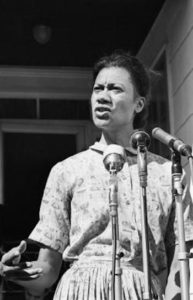
Gloria St. Clair Hayes Richardson
*Gloria St. Clair Hayes Richardson was born on this date in 1922. She was a Black administrator, politician, and activist.
Gloria St. Clair Hayes, the only child of John Edwards Hayes and Madel Pauline (St. Clair) Hayes, was from Baltimore, Maryland. Her grandfather, H. Maynadier St. Clair, was a city council member in Cambridge from 1912 to 1946. The family lived in Baltimore for six years before moving to Cambridge, Maryland. Young Hayes graduated from Frederick Douglass High School, now Maces Lane High School, and in 1942, graduated from Howard University.
In 1962 Richardson became co-chair of the Cambridge Nonviolent Action Committee (CNAC). Richardson saw fundamental problems facing Blacks: adequate housing, educational discrimination, job opportunities, and health. After a survey of the Black community, fifteen demands were made, attacking the entire system of segregation and requesting equal treatment for all, including police protection. Richardson and the CNAC appealed to the City Council to hear their demands and organized outside support for possible demonstrations.
On March 25, 1963, Richardson and co-chair Inez Grubb began picketing and sit-ins for the next seven weeks at City Hall, the County Courthouse, and the jail. She and eighty protesters were arrested at the Dizzy Land Restaurant on May 14, 1963, and the much-publicized "Penny Trials" were held. After their release, Richardson appealed to Attorney General Robert F. Kennedy for a federal investigation of violations of constitutional rights in Cambridge. Criticized by many, including Kennedy, Martin Luther King, the NAACP, columnists, and television commentators, Richardson held to her faith in a moral cause, her belief in achieving results, and her compassion for the alienated.
Compounding the restlessness in Cambridge was action on the state level by segregationist groups to block the June 2, 1963, application of the Public Accommodation Law by securing petitions to put the statute to a referendum vote in 1964. Violence broke out over the continued arrest of demonstrators in the late spring of that year. Fires started, and incendiary bombs were found. Richardson again appealed to Robert Kennedy for federal aid. On June 13, 1963, state troopers blocked all approaches to the Black district.
About 500 Maryland National Guard troops, the entire Eastern Shore Battalion, and about 235 soldiers of the Maryland State Police force were either on patrol or called in to the bivouacs in the Cambridge Armory, the American Legion Hall. In nearby motels, martial law was imposed on Cambridge. In July 1964, the same month the National Guard officially withdrew from Cambridge, President Lyndon B. Johnson signed the 1964 Civil Rights Act into law. In August, Gloria Richardson left Cambridge to move to New York. She married her second husband, Frank Dandridge. Her direct action netted results in the civil rights movement.
Throughout the Cambridge Movement, Richardson established working contacts with many prominent civil rights proponents; Malcolm X, Stokely Carmichael, Adam Clayton Powell, Lena Stone, Dick Gregory, John Lewis, and others. She worked with the Student Nonviolent Coordinating Committee (SNCC), the Civic Interest Group (Cambridge), and others. She led the Second Ward of Cambridge, Maryland, during the turbulent sixties in efforts to desegregate the city. Richardson is a program officer at the Department for Aging in New York City. In 2017, Maryland honored her legacy by dedicating February 11 as "Gloria Richardson Day."
Although Richardson could not travel as planned to Cambridge's historic Bethel AME Church to be recognized in person, she spoke to the packed church in a live remote broadcast from her apartment. Five months later, the Eastern Shore Network for Change (ESNC) facilitated a fireside chat at the Hyatt Regency Chesapeake Bay Resort in Cambridge. Richardson was a featured speaker at the Reflection banquet, where her remarks "brought 300 guests to their feet in a sustained standing ovation."
Richardson helped to establish a new image for Black women in the United States. She replaced the image of a long-suffering martyr with a woman as a warrior. When Richardson was asked how she would like to be remembered, she replied: "I guess I would like for them to say I was true to my belief in black people as a race." She died in New York on July 15, 2021.